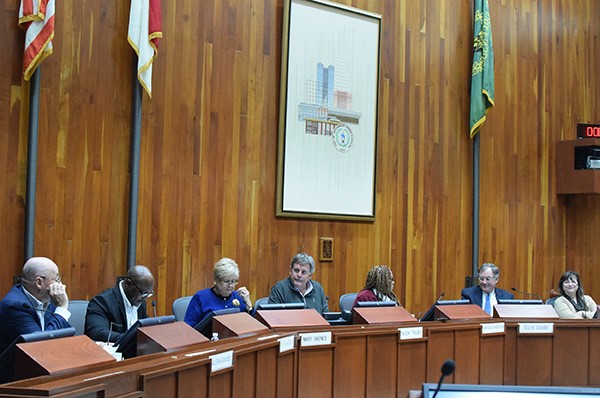The Greensboro Board of Adjustment may not be in revolt like the Zoning Commission but it is certainly annoyed by the new regulations imposed by the Greensboro City Council on members of volunteer boards and commissions.
At the Board of Adjustment meeting on Tuesday, May 28, no one had anything good to say about the rules the City Council recently passed and one Board of Adjustment member Mary Skenes said she had no intention of signing the agreement stating she will follow the rules. She noted that six members of the Zoning Commission had said the same thing, so she wasn’t alone.
Skenes did most of the speaking, but there were a lot of heads nodding in agreement on the board as she lambasted the new rules as insulting and unnecessary. She said, “So now I have to go to a doc in a box to get an excuse in order to have an excused absence.”
Skenes said, “I’m offended that people who have been appointing me to boards and commissions for twenty-some years, now don’t think I have enough sense to know whether I should attend a meeting.”
She added, “I think this is well beyond the scope of what they need to be dictating.”
The presentation on the new rules given by Planning Manager Mike Kirkman had changed quite a bit from the presentation he gave to the Zoning Commission. This time Kirkman didn’t say board members needed to bring a note from their doctor in order to qualify for an excused absence. Mayor Nancy Vaughan, after the Zoning Commission blow up, said no note was needed. But that’s not what the ordinance passed by the City Council states.
The ordinance states: “Appointees will be allowed 3 unexcused absences per rolling 12 month period (to coincide with term), after which the appointee will be subject to dismissal. Excused absences are granted by the board or commission based only on (1) written medical justification signed by a duly authorized Doctor of Medicine or (2) due to a family death, emergency, or illness.”
The City Council could at its next meeting revise the ordinance to something more palatable, however, Vaughan does not have the authority to change a city ordinance.
And Skenes noted that the problem with poor attendance at meetings of boards and commissions was often not the fault of the members, but the fault of City Council.
She said, “If Council is truly that concerned about attendance and quorums on boards and commissions they need to be more timely on making their appointments. We have been without an alternate for seven or eight months. Council needs to observe their own requirements to make sure they have a full compliment including alternates.”
Skenes has a point, but there is a good reason that Council can’t make the appointments in a timely manner and it is because of it’s own priorities appointing members to boards and commissions has become vastly more complicated. The goal is not to have qualified people, interested in whatever the board or commission covers, but diversity.
Each board and commission is expected to have the same number of members from each council district, since there are five council districts and almost all the boards now have nine members, it is a mathematically impossible task. Also each board and commission is supposed to reflect the demographics of the city. It has made appointments far more challenging.
And actually the majority on the City Council which is made up of eight women and one man haven’t expressed much concern about having enough male representation on boards and commissions.
They also want more younger members and City Councilmember Michelle Kennedy has expressed concern that the LGBT community was under represented.
If enough sitting members of boards and commissions refuse to sign the agreement, the City Council will be forced to take another look at the ordinance. Since this City Council spent six months revising and revisiting the panhandling ordinance last year, it seems it could give half that consideration to the volunteers who help run the city.
The Board of Adjustment passed every request before them unanimously. This board is a good example of how a board should operate. Board members ask questions, discuss issues and then vote and move on to the next item. The board gets its work done efficiently and with a smile for the nervous folks standing before them.

